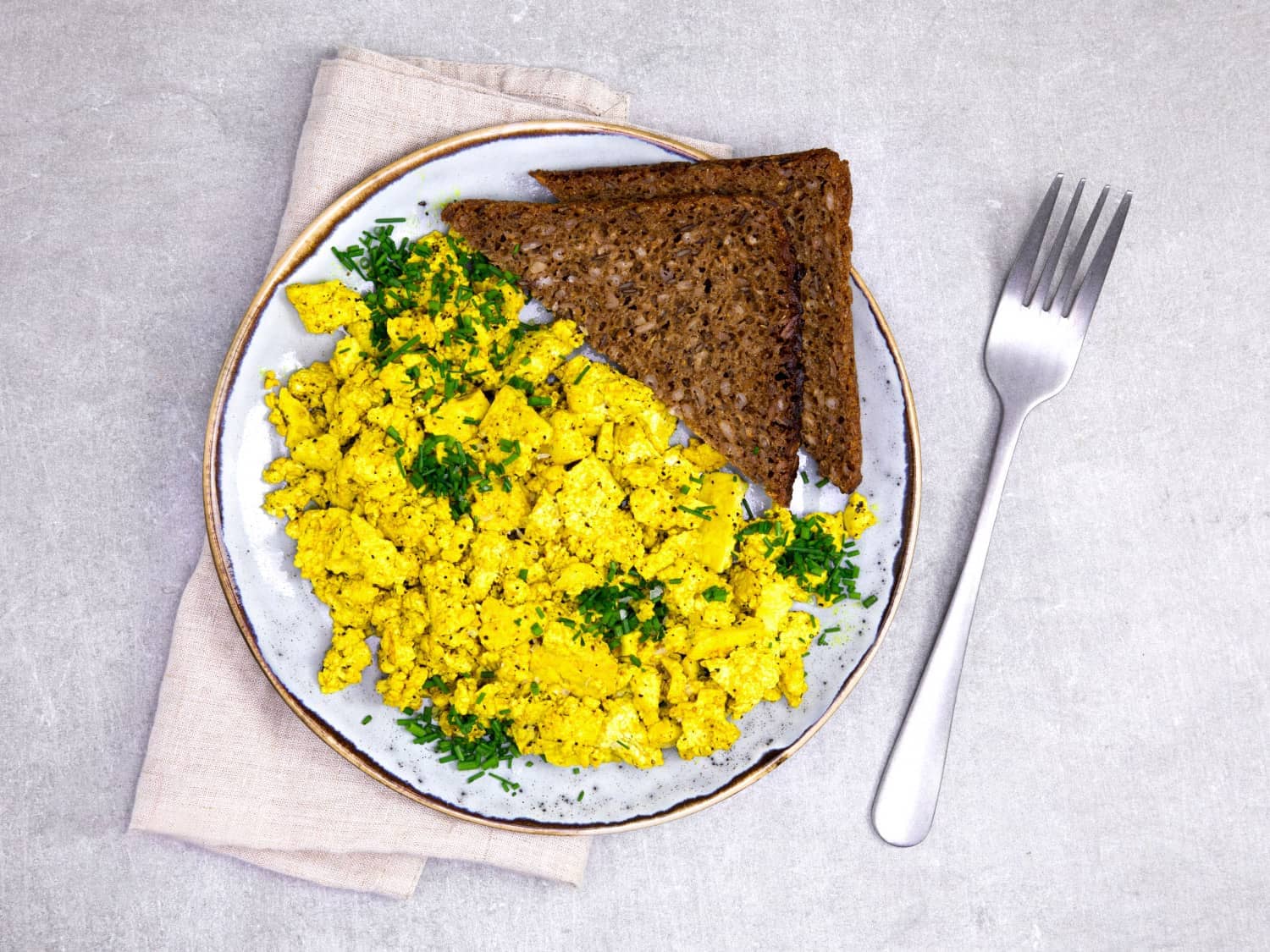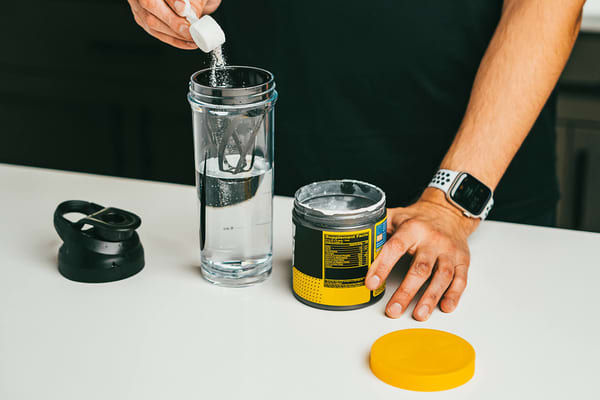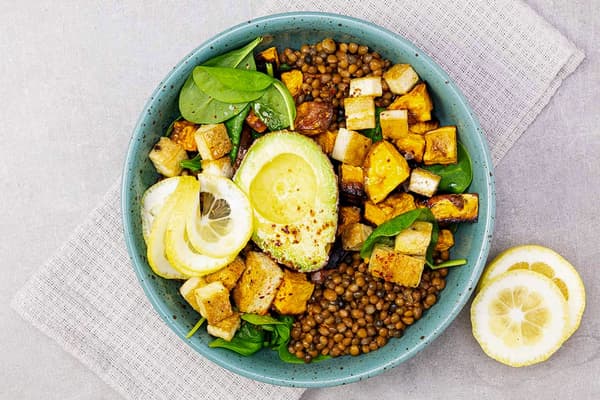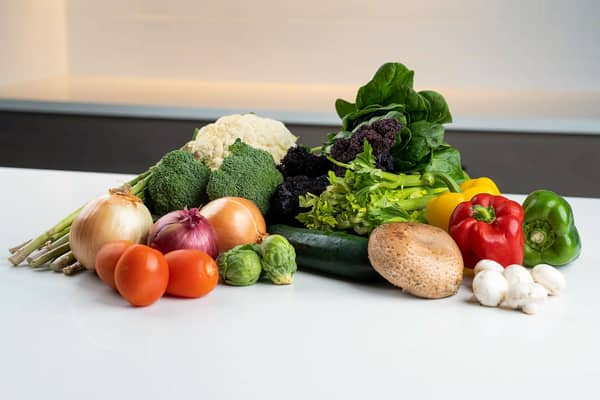How Much Protein Do You Really Need to Build Muscle?
Nutrition
Find out how much protein you should eat each day to maximise muscle growth, as well as the best lean sources of protein—for vegetarians and omnivores.

Protein is one of three main macronutrients your body needs to function properly, along with carbohydrates and fat. And if you're trying to build muscle, protein is especially important.
Protein requirements are higher for all athletes, but they're highest for weight lifters. Find out how much protein you should consume during each meal and throughout the day, as well as the best protein sources for muscle hypertrophy (growth).
What Is Protein?
Protein is often referred to as a building block for the body, as it's used to build and repair tissue—including muscle. But to get sciencey for a minute, protein is technically an organic compound consisting of amino acids linked by peptide bonds.
Dietary protein is what you get from food and is commonly found in animal products such as meat, dairy, eggs, poultry and seafood. Plant-based protein includes beans, lentils, certain grains (like quinoa) and legumes (think chickpeas). And you'll also increase your protein intake when you consume vegetables like Brussels sprouts or spinach.
Some people also take protein supplements usually in the form of powder. Whey protein powder (made from the whey found in milk) is very popular, along with other types such as soy protein powder or pea protein powder.
Experts generally advise that you get your protein from food sources. However, a 2017 position paper from the International Society of Sports Nutrition (ISSN) acknowledges that supplementation is often more practical, particularly for athletes who typically complete high volumes of training.
Amino Acids and Complete Proteins
Amino acids are the molecules that combine to form protein. Your body makes most of them. But nine amino acids are considered essential because the body doesn't make them, and therefore, you need to consume them in food. The nine essential amino acids are:
Histidine
Isoleucine
Leucine
Lysine
Methionine
Phenylalanine
Threonine
Tryptophan
Valine
Some sources of dietary proteins are called "complete proteins" as they contain all nine essential amino acids. Most animal foods are complete proteins. Fewer plant-based foods are complete proteins, although some foods like legumes and certain grains (such as quinoa) are.
Branched-Chain Amino Acids
Certain amino acids are called branched-chain amino acids (BCAAs) because of their structure. The branched-chain amino acids are leucine, valine and isoleucine.
Some people believe BCAAs are better for building muscle and reducing muscle breakdown than other amino acids. But studies on the topic have yielded mixed results. A 2017 review in the Journal of the International Society of Sports Nutrition even went as far as to say that the belief is completely unwarranted.
Why Is Protein Important?
You need protein for essential body functions, including producing hormones and enzymes. Protein can be used as an energy source and plays a key role in two processes essential in building muscle: muscle protein breakdown and muscle protein synthesis.
Muscle protein breakdown (MPB) occurs during your workout when muscle fibres are (intentionally) stressed and damaged. During recovery, muscle protein synthesis (MPS) happens. During this phase, your muscle fibres rebuild with the help of available amino acids.
Building muscle requires that the rate of muscle protein breakdown (MPB) is lower than the rate of muscle protein synthesis (MPS). So getting enough protein in your diet is key, since amino acids are needed for the rebuilding and repair phase.
How Much Protein Do You Need to Build Muscle?
There are different ways to determine how much protein you need each day. You can calculate it as a percentage of your daily calories or you can use your body weight. The US Department of Agriculture (USDA) provides dietary guidelines based on a percent of daily calories, but sport organisations such as ISSN provide gram ranges based on body weight.
USDA Recommendations for the General Public
According to the USDA Dietary Guidelines for Americans, 2020–2025, adults should consume 10–35 percent of their daily calories from protein. For example, if you consume 2000 calories per day, you would consume 200–700 calories from protein per day. That is equivalent to 50–175 grams of protein per day. Those who are sedentary need less protein, while those who are highly active need more.
The USDA goes on to provide recommended weekly amounts of protein subgroups. They suggest that adults consume 737 grams per week of meat, poultry or eggs, 227 grams per week of seafood, and 142 grams per week of nuts, seeds and soy products. The USDA also has suggestions for protein sources for vegetarians, including foods like dairy and soy.
Protein Requirements for Athletes
The ISSN's 2017 paper regarding protein for athletes is widely used by sport nutrition experts to determine the protein needs of all athletes, including strength-trained athletes.
According to the paper, an overall daily protein intake in the range of 1.4–2.0 grams of protein per kg of body weight per day is sufficient for building and maintaining muscle mass. They add that this amount is in line with the Acceptable Macronutrient Distribution Range for protein and is consistent with USDA recommendations.
However, the ISSN goes on to say that higher protein intakes (greater than 3.0 grams of protein per kg of body weight per day) can have positive effects on body composition in resistance-trained individuals.
Lastly, ISSN suggests that protein should ideally be consumed evenly throughout the day every 3 to 4 hours. In general, you should consume 20 to 40 grams at a time (at mealtime or in a snack) or 0.25 grams per kg of body weight. The best protein sources are those that include a balanced array of amino acids, particularly leucine.
The Bottom Line
There's no one-size-fits-all number for grams of protein for building muscle mass. The nutrient ranges provided by the USDA and ISSN work for most people, but every body is unique.
To determine the best amount for you, start with a number that seems reasonable and doable within the ranges provided by the experts. Then, keep a food and training journal to track your progress. Make adjustments based on your success. You may also find that working with a certified sport nutrition expert is the easiest way to create a meal plan for building muscle.
Frequently Asked Questions
Is There Such a Thing as Too Much Protein?
Yes, you can consume too much protein. This is defined as eating more than the recommended dietary allowance for healthy adults.
When this happens, it's likely that you'll also under consume other nutrients (carbs and fat). Long-term consequences may include bone disorders, impaired kidney function, increased cancer risk, liver disorders and increased risk of coronary artery disease.
What Are Examples of Lean, High-Protein Foods?
When looking for protein-rich foods, you may want to avoid foods that are high in saturated fat. The USDA recommends consuming no more than 10 percent of your daily calories from saturated fat.
Consider some of these lean protein options:
- Chicken breast: 31g per 100g serving (chopped or cubed)
- Lean beef: 26g per 100g serving
- Tuna: 25g per 85g serving
- Cottage cheese: 25g per cup
- Salmon: 17g per 85g serving
- Peanut butter: 8g per 2-tablespoon serving
- Eggs: 6g per large egg
What Other Factors Impact Muscle Growth?
Along with diet, your training plan will determine how well you build muscle. A workout plan for muscle hypertrophy generally requires that you train two to four days a week with a programme that includes three to six sets of six to 12 reps per exercise. You should lift 75–85 percent of your one-rep max (or 1RM) to help build muscle mass, according to the National Academy of Sports Medicine.
Your hormone levels can also play a role in how well you build muscle. However, it's not advised that you take hormones unless prescribed by your doctor.
For more expert-backed advice, be sure to download the Nike Training Club App!





